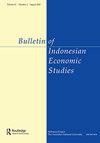通过职业和高等教育提高竞争力:印度尼西亚2019-2024年人力资本发展愿景
IF 2.3
2区 经济学
Q1 AREA STUDIES
引用次数: 22
摘要
本文探讨了印度尼西亚为应对人口和经济结构的变化而提升人力资本的准备情况,以利用第四次工业革命的技术进步。印尼可以清楚地观察到过早去工业化的症状,这表明它需要提高生产力,以适应数字破坏和结构性经济变化。供应方的发展需要基础设施和人力资源的开发。在生产方面,印尼需要振兴其制造业、服务业和资源型行业,将其视为融入全球网络的价值链。印度尼西亚旨在提升人力资源和提高国家竞争力的教育政策框架侧重于五个领域:获得教育的机会;教育质量;政府、工业和高等教育之间的协同作用;产业联系;以及激励措施。与此同时,新冠肺炎疫情造成的混乱迫使印尼教育系统立即彻底改变教学方法,以适应疫情和疫情后的条件。本文章由计算机程序翻译,如有差异,请以英文原文为准。
Improving Competitiveness Through Vocational and Higher Education: Indonesia’s Vision For Human Capital Development In 2019–2024
This article explores Indonesia’s readiness to upgrade its human capital in response to changes in population and economic structure in order to harness the technological advances of the Fourth Industrial Revolution. The symptoms of premature deindustrialisation can be clearly observed in Indonesia, suggesting that it needs to improve its productivity to adapt to digital disruption and structural economic change. Supplyside advancement will require infrastructure and human resource development. On the production side, Indonesia will need to revitalise its manufacturing, service and resource-based sectors, treating them as value chains to be integrated into global networks. Indonesia’s education policy framework to upgrade human resources and improve the country’s competitiveness focuses on five areas: access to education; quality of education; synergies between government, industry and higher education; industry linkages; and incentives. Meanwhile, the disruption caused by the Covid-19 pandemic is forcing the Indonesian education system to instantly revolutionise its teaching methods to adapt to pandemic and post-pandemic conditions.
求助全文
通过发布文献求助,成功后即可免费获取论文全文。
去求助
来源期刊

Bulletin of Indonesian Economic Studies
Multiple-
CiteScore
9.20
自引率
9.80%
发文量
18
期刊介绍:
The Bulletin of Indonesian Economic Studies, a peer-reviewed journal published by the Indonesia Project at The Australian National University"s College of Asia and the Pacific, fills a significant void by providing a well respected outlet for high-quality research on any and all matters pertaining to the Indonesian economy, and touching on closely related fields such as law, the environment, government and politics, demography, education and health. In doing so, it has played an important role in helping the world, and Indonesians themselves, to understand Indonesia.
 求助内容:
求助内容: 应助结果提醒方式:
应助结果提醒方式:


